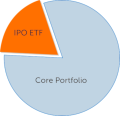All four companies that were slated to go public this week successfully completed their deals, though three priced at the bottom of their proposed ranges and one was forced to cut its deal size by 18%.
Two of the four IPOs, Baltic Trading Limited (BALT) and Crude Carriers (CRU), were international shipping companies, which have exhibited an increase in filing activity in recent weeks (see Scorpio Tankers (STNG); Alma Maritime (AAM)). Baltic Trading, which was formed by Genco Shipping to acquire a spot market-focused fleet of drybulk vessels, raised $228 million by listing 16.3 million shares on the NYSE on Wednesday. The IPO priced at $14, the low end of the $14-$16 range, and the stock remained relatively flat in its debut. It has since gained roughly 1% in the aftermarket.
Crude Carriers, which began trading today on the NYSE, also priced at the low end of its $19-$21 range, raising $257 million. The company is managed by Capital Maritime and plans to acquire crude tankers that will operate primarily in the spot market. Shares were down more than 3% by early afternoon. The lackluster trading performances displayed by both Baltic Trading and Crude Carriers may be caused by investor aversion to the risk associated with the spot market exposure planned by both companies.
The other company to come to market today was AVEO Pharmaceuticals (AVEO), a Cambridge-based biotech developing a treatment for renal cell carcinoma (RCC), had initially expected to raise $98 million by offering 7 million shares at a range of $13-$15. AVEO ended up raising $81 million by selling 9 million shares at $9 per share, cutting the original deal size by 18%. The biotech's stock is currently trading at roughly 5% below its float price, indicating investors may not be willing to take on the risk that comes with small cap biotechs in today's mixed economic environment.
The only company to post a positive first day performance this week was Sensata Technologies (ST), which manufactures customized sensors and controls that are used in mission critical applications, from braking systems in cars to air conditioners. The former division of Texas Instruments raised $569 million by offering 31.6 million shares at $18, the low end of its $18-$20 range, and saw its stock rise almost 3% in its debut. Sensata, which was the largest 2010 IPO in the US, shows that a significant capital raise is still possible with strong fundamentals (leading market position, long-term client relationships and strong cash flow generation) and appropriate pricing.
This week's four IPOs broke the short lull in IPO activity that began after five deals were completed during the week of February 8th. Chinese advertising company Redgate Media (RGM) and highly anticipated technology-enabled investment advice provider Financial Engines (FNGN) are lined up for next week and will be followed by five
upcoming IPOs scheduled for the week of March 22nd.
Notable IPO filings this week include that of the Chicago Board Options Exchange (CBOE), which is the largest options exchange in the US. There have been nine US filings submitted so far this month and thirty-nine year-to-date, as compared with four filings for the entirety of the first quarter in 2009.


